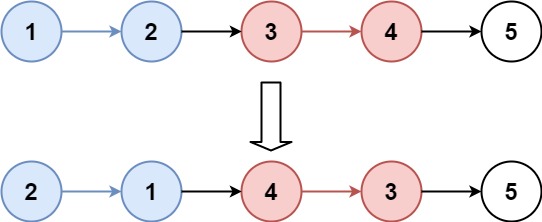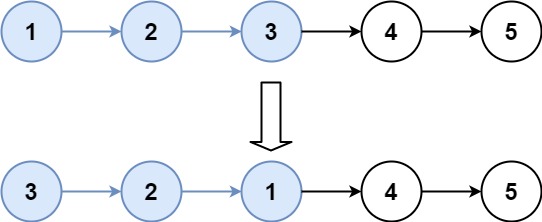LeetCode in Cpp
25. Reverse Nodes in k-Group
Hard
Given a linked list, reverse the nodes of a linked list k at a time and return its modified list.
k is a positive integer and is less than or equal to the length of the linked list. If the number of nodes is not a multiple of k then left-out nodes, in the end, should remain as it is.
You may not alter the values in the list’s nodes, only nodes themselves may be changed.
Example 1:

Input: head = [1,2,3,4,5], k = 2
Output: [2,1,4,3,5]
Example 2:

Input: head = [1,2,3,4,5], k = 3
Output: [3,2,1,4,5]
Example 3:
Input: head = [1,2,3,4,5], k = 1
Output: [1,2,3,4,5]
Example 4:
Input: head = [1], k = 1
Output: [1]
Constraints:
- The number of nodes in the list is in the range
sz. 1 <= sz <= 50000 <= Node.val <= 10001 <= k <= sz
Follow-up: Can you solve the problem in O(1) extra memory space?
Solution
/**
* Definition for singly-linked list.
* struct ListNode {
* int val;
* ListNode *next;
* ListNode() : val(0), next(nullptr) {}
* ListNode(int x) : val(x), next(nullptr) {}
* ListNode(int x, ListNode *next) : val(x), next(next) {}
* };
*/
class Solution {
public:
ListNode* reverseKGroup(ListNode* head, int k) {
if (head == nullptr || head->next == nullptr || k == 1) {
return head;
}
// Check if there are at least k nodes remaining
ListNode* len = head;
for (int j = 0; j < k; ++j) {
if (len == nullptr) {
return head; // Less than k nodes, return the list as is
}
len = len->next;
}
// Reverse k nodes
ListNode* prev = nullptr;
ListNode* curr = head;
ListNode* next = nullptr;
for (int i = 0; i < k; ++i) {
next = curr->next;
curr->next = prev;
prev = curr;
curr = next;
}
// Recursively call for the next k nodes
if (next != nullptr) {
head->next = reverseKGroup(next, k);
}
return prev;
}
};

